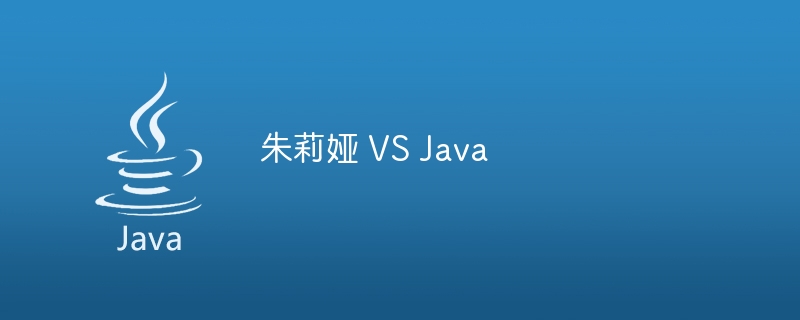Home >Java >javaTutorial >Julia VS Java
Julia VS Java
- 王林forward
- 2023-09-05 19:49:021368browse

Julia and Java
Julia is a dynamic programming language, while Java is an object-oriented programming language. Julia includes user-friendly syntax, while Java is a specialized programming language.
Julia and Java are both programming languages used to create different types of applications. Both provide different types of features to simplify coding. Julia supports parallel and distributed computing. Java will not run to incorrect method addresses. Java allows garbage collection. Julia beats Java in terms of syntax, speed, and application.
Therefore, we will cover the main differences between these two widely used programming languages in this article.
What is Julia?
Julia is a dynamic programming language that is open source in nature. It was developed in 2012 by four people at MIT, India. It provides simple and user-friendly syntax and has high execution speed. It supports parallel and distributed computing. It provides cloud computing and is very useful for analyzing big data. It also enables documentation and package management out of the box, and has a key feature called multi-dispatch in scientific and mathematical code. The Julia Read-Eval-Print loop provides a quick test of your code's behavior. It has fast built-in functions and is more comfortable than user-defined types. Therefore, it can be concluded that Julia beats Java in terms of syntax, speed, and application.
Features of Julia
The following are some functions and features of the programming language Julia -
It provides lightweight green threads
It is a dynamic programming language
Provide high execution speed
Its built-in functions are very fast
Suitable for cloud computing
Easy to analyze data
User-friendly syntax
Provide quick testing
Allow package management now
There is a key feature called multi-scheduling in scientific code
Julia’s scope
Julia’s lead designers and developers have made it clear that Julia was designed to identify gaps between existing software toolsets in technical computing disciplines −
Performance - Practical computing always requires high performance. The production version of another language also offers better performance, with Julia providing its developers with high execution speeds.
Prototyping - This is a major programming problem that many users face while creating applications. It requires a high-level and flexible programming language, and Julia allows for on-the-fly documentation and package management.
Speed - It plays an important role in every programming language for creating efficient applications. Many languages lack this, and Julia provides a simple and user-friendly syntax that makes its execution simple and fast.
What is Java?
Java is an object-oriented programming language that provides a series of garbage collection methods. It provides exceptions and interfaces to users, and it is a multi-purpose language that is self-contained. It is a powerful, portable and highly secure language. It was developed by James Gosling at a company called Sun Microsystems. It was first developed in 1991. It provides various protection measures to prevent crashes. It is available in three editions namely Java Standard Edition, Java Enterprise Edition and Java Micro Edition. It is a platform-independent programming language. It is a famous and simple programming language.
Features of Java
The following are some important features and functions of the programming language Java:
It is platform independent
Its nature is powerful
This is a very safe language
It is a universal language
Provide multiple safeguards
Everyone knows
Direct and clear language
Object-oriented programming language
Includes classes, objects, polymorphism, etc.
There are three versions
Easy to understand
Scope of Java
The main developers and core designers always add something new in the updated version of Java, and they made it clear from the beginning that Java will keep up with the latest trends and will always launch new and effective features -
Performance - Java always focuses on its performance and they are upgrading themselves to high-speed execution with the latest versions
Prototypes - This is a major problem in the language, but Java is upgrading to high-performance prototypes. Therefore, their users can easily create applications using Java.
Speed - Sometimes Java falls short in this area, but they are working on improving their language so that it doesn't have too much trouble executing at high speeds.
Julia and Java
Function |
Julia |
JAVA |
|---|---|---|
grammar |
User-friendly syntax |
Complex syntax |
speed |
Faster than Java |
Slower than C/C |
Library |
Limited library set |
Multiple libraries |
Community |
Not as popular as Java |
More popular than Julie |
Code conversion |
Has the same syntax as Python, so converting directly from C/C is difficult |
Has the same syntax as C/C, so converting directly from Python is difficult |
Dynamic Type |
Dynamic but weakly typed |
Static and strongly typed |
Array index |
Array index starts from 1 |
Array index starts from 0 |
in conclusion
Julia is an open source dynamic programming language, while Java is an object-oriented programming language. In Julia, array indexing starts from 1, while in Java, array indexing starts from 0. In terms of syntax, speed and application, Julia is considered better than Java. Julia is even less popular than Java. Julia contains a limited collection of libraries, while Java contains a large collection of libraries.
The above is the detailed content of Julia VS Java. For more information, please follow other related articles on the PHP Chinese website!

